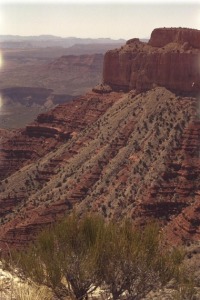US senators, congressmen, mining companies and nuclear industry representatives have criticised a final decision to ban new uranium mining on land near the Grand Canyon for the next 20 years.
 |
| Grand Canyon Parashant National Monument (Image: BLM/Arizona) |
US Interior Secretary Ken Salazar's announcement of the withdrawal of over 1 million acres (nearly 405,000 hectares) of federal lands in northern Arizona brought down the curtain on over two years of evaluations. The land was withdrawn under a two-year temporary segregation in July 2009, extended by six months in June 2011, while studies were completed. An environmental impact statement (EIS) prepared as part of the process considered alternatives to the withdrawal, although speaking in anticipation of the final EIS, Salazar confirmed total withdrawal as the preferred option in June.
The withdrawal does not prohibit previously approved uranium mining, but it does prevent new projects that could be approved on claims and sites with valid existing rights. Other natural resource development including mineral leasing, geothermal leasing and mineral materials sales will still be allowed. According to US Bureau of Land Management (BLM) director Bob Abbey, this would maintain the pace of hardrock mining, particularly uranium, near the Grand Canyon while allowing the monitoring of impacts associated with uranium mining. "It preserves the ability of future decision-makers to make thoughtful decisions about managing this area of national environmental and cultural significance based on the best information available," he said.
BLM projections suggest that up to 11 uranium mines, four of which are currently approved, could still be developed in the withdrawal area over the next 20 years based on valid pre-existing rights. Without the withdrawal, the EIS suggested that the area could have seen as many as 30 uranium mines in the same period.
Salazar said that the withdrawal was "the right approach for this priceless American landscape", considering not only the amenity of the Grand Canyon to visitors but also its status as a sacred place to numerous American Indian tribes and the role of the Colorado River on which millions of people depended for drinking water, irrigation and industrial use. "We have been entrusted to care for and protect our precious environmental and cultural resources, and we have chosen a responsible path that makes sense for this and future generations," he said.
Politicians demur
Others were not so convinced of the righteousness of Salazar's chosen path. A group of eight US senators and congressmen led by Arizona senator John McCain issued a statement denouncing the decision. The group asserts that the decision disregards the 1984 Arizona Wilderness Act, agreed through negotiation with environmental groups, which permanently locked away from mining over 650,000 acres outside the Grand Canyon designated as wilderness while affirming the compatibility of mining with conservation interests in other areas. They also noted that the Interior Department's own studies had found "no conclusive evidence" that mining operations in the area were harmful to the Grand Canyon watershed.
McCain described the ban on uranium mining as a devastating blow to job creation in the region. "This decision is fueled by an emotional public relations campaign pitting the public's love for the Grand Canyon against a modern form of low-impact mining that occurs many miles from the Canyon walls and in no way impacts the quality of drinking water from the Colorado River," he said.
Wyoming senator John Barrasso described Salazar's decision as "irresponsible". Utah senator Mike Lee accused Salazar, and the administration of President Barack Obama, of making the decision to appease environmentalists during an election year. Lee described the announcement as "a needless overreaction to a fictitious problem."
Industry in opposition
Speaking on behalf of the US nuclear industry, the Washington DC-based Nuclear Energy Institute (NEI) also issued a statement opposing the ban, citing the lack of any scientific justification for the administration's decision.
NEI's Alex Flint said that the decision would make it harder for the USA to reduce its dependence on imported sources of energy. Highlighting the US nuclear energy industry's record of environmental stewardship at facilities across the country, he reiterated the lack of any suggestion in the EIS on the prohibition that uranium mining near the Grand Canyon would compromise that record. "Phantom fears do not a reasoned, successful energy policy make," Flint added.
Vane Minerals is one of the mining companies affected by the prohibition order. Vane CEO David Newton said that the confirmation of the withdrawal was "disappointing, particularly given the strong local and regional support for mining from various governmental offices," but not unexpected. Vane, which has a portfolio of uranium projects in Utah and northern Arizona, had already adjusted its business plan accordingly to focus predominantly on its copper exploration program, supported by its gold and silver activities in Mexico, he said.
Researched and written
by World Nuclear News




_23009.jpg)
_33392.jpg)
_53504.jpg)







